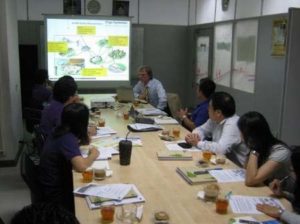
Smart Thai Overview
Most of the world's electrical delivery system or "grid" was built when energy was relatively inexpensive. There have been some upgrades to meet the growing demand, but the grid still operates like it did 100 years ago—energy flows over the grid from central power stations to customers and reliability is ensured by maintaining excess capacity. The result is an inefficient and environmentally wasteful system that is an emitter of environmental gasses, consumer of fossil fuels, and not well suited to take advantage of the available distributed and renewable generation (such as wind, solar, and hydro).
The recent surge in energy prices and increased demand in the international market has renewed the continuing concerns of both governments and individuals regarding our rapidly depleting fossil fuel resources. The Government of Thailand is reviewing all possible sustainable scenarios in the supply and use of energy resources as one of the plausible solutions to the energy crisis.
But is Thailand ready for a transformation of its generation, transmission and distribution network into a smart/intelligent network that would revolutionise the way the grid system is operated and managed, thereby harnessing significant economic rewards and environmental benefits? Not now. And not in several years… if there is no conscious strategic plan and implementation programme to move towards this direction. This project aims to build capacity, improve policies and support piloting activities that is envisaged to transform the generation, transmission and distribution systems into a smart/intelligent network.
Project Outcomes
Component 1: Mainstreaming Smart/Intelligent Grid systems in the generation, transmission and distribution activities in Thailand
- Result 1.1: Supporting policies and regulatory frameworks for the adoption of Smart/Intelligent Grid systems strengthened
- Result 1.2: Understanding of relevant government agencies on the application of Smart/Intelligent Grid systems enhanced through dialogues with EU counterparts
Component 2: Capacity building, knowledge management and institutional development
- Result 2.1: Knowledge platform for the promotion and implementation of Smart/Intelligent Grid systems established and operational
- Result 2.2: Handbook on Smart/Intelligent Grid systems development and deployment, including EU best practices, completed and disseminated
- Result 2.3: Capacities of relevant public and private organisations on Smart/Intelligent Grid systems developed through workshops, training, corporate exchanges, and public-private partnerships
Component 3: Supporting the introduction of pilot Smart/Intelligent Grid systems
- Result 3.1: Technical and economic feasibility of implementing Smart/Intelligent Grid systems on a pilot basis, including CDM potential, established